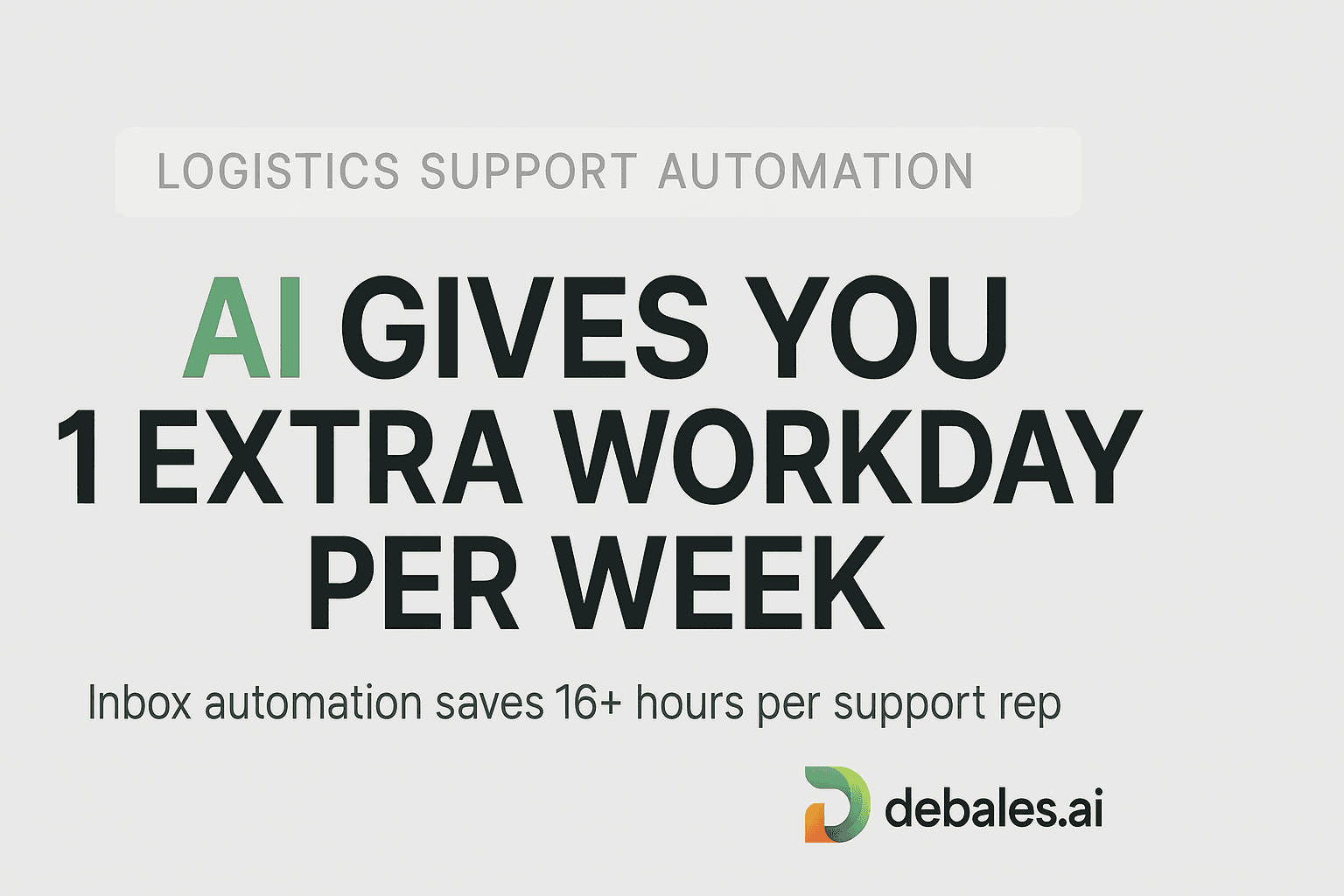AI Gives Support Teams 1 Extra Day per Week
Wednesday, 11 Jun 2025
|
How AI Gives Your Support Team an Extra Day Per Week
(AI Boosts Productivity by 66% for 3PLs and Warehouse Ops)
A 66% productivity boost doesn’t just sound good—it is good, especially when it means giving your support team the equivalent of an extra full workday each week. That’s the real benefit of integrating AI agents into logistics and warehouse email workflows.
Whether you're responding to quote requests, sending order confirmations, or handling shipment inquiries, AI frees your team from repetitive tasks. Here’s how that translates to real-world gains—and why logistics leaders can no longer wait.
From Inbox Overload to Week-Long Efficiency Gains
Manual support tasks consume around 40% of most logistics support teams’ time. When AI agents take over routine handling—reading, categorizing, routing, and even replying—the result is a time savings of roughly 16–18 hours per person per week.
For a five-person support team, that adds up to over 80 hours—roughly equivalent to a full workweek.
This productivity gain is in line with the rapid AI adoption in logistics. Now that the Generative AI logistics market is projected to reach $7 billion by 2030—up from $1.3 billion in 2024—it’s clear that inbox automation is essential for competitiveness
Discover why inbox automation is now table stakes.
Why AI Agents Are So Effective
AI excels at two core functions:
Instant classification and routing: Email requests are sorted instantly into RFQs, order issues, shipping updates, etc.
Auto-response for common queries: Whether confirming an order, attaching a bill of lading, or providing rate quotes, AI handles up to 80–95% of messages without human input.
This operational shift echoes the larger automation trend seen in Amazon’s fulfillment centers, where AI-driven robots reduce costs and streamline operations
How Amazon cut fulfillment costs by 20% with AI.
Real-World Results: FFTs and 3PLs See the Difference
A Chicago-based 3PL firm deployed AI into their support workflow and in 30 days saw:
- Email response times drop from 8 hours to under 3 minutes
- Five-person team gained roughly 90 hours/week in freed capacity
- Support escalations dropped by 70%
These gains are consistent with what we see across logistics teams using AI:
- Faster quote and support handling
- Clear ROI from saved hours and reduced headcount needs
See more here:
Support cost savings in 3PL email workflows.
A Complete AI-Driven Logistics Stack
Productivity doesn’t stop at the inbox. Leading firms are integrating AI across operations:
- Email support: Instant SLA compliance and smart escalation
Explain why support teams need AI now - Order intake and automation via WMS
See order AI ROI in warehouse operations - Predictive maintenance and logistics optimization
Learn from Maersk’s $300M AI-led savings
Combined, these systems free up time, improve accuracy, and let your team focus on higher-value work.
How to Make It Happen in Your Organization
Start with a small AI pilot:
Choose one email stream (sales, support, or order starts)
Introduce an AI inbox agent to classify, auto-reply, and escalate
Measure outcomes: average reply time, % of emails auto-resolved, agent hours reallocated
Scale the model to other teams or operations
By doing this, you’re choosing to buy back nearly a full day of capacity per support team member each week.
Bottom Line
AI in the inbox is more than buzz—it’s a productivity multiplier. With agents handling up to 95% of routine interactions, support teams gain 16–18 hours weekly. Even mid-sized logistics operators can start reaping these benefits now, without needing a robotics budget.
If you're ready to accelerate your support team's efficiency:
All blog posts
View All →
Wednesday, 4 Mar 2026
Why your freight costs keep creeping up (and how to stop it)
Freight costs rise quietly through accessorials, detention, and bad data. Learn what keeps breaking and a practical playbook to control spend.

Wednesday, 4 Mar 2026
Why accessorial charges keep blowing up your freight
Accessorials are quietly wrecking freight budgets. Learn why they keep happening, what data shows, and how to reduce detention and surprises this week.

Wednesday, 4 Mar 2026
Why accessorials keep blowing up your freight budget
Detention, layover, and surprise fees are wrecking freight margins. Learn why it keeps happening and how to reduce accessorial spend this week.